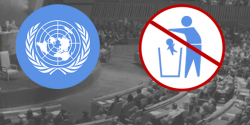Published: 29.09.2017

The UN Human Rights Committee intends to rely on international safeguards of the right to life to establish a “pseudo-right” to abortion and euthanasia. In its new draft General Comment to Article 6 of the International Covenant on Civil and Political Rights, the Committee divests the youngest children of legal protection and forces States to legalize euthanasia. Ordo Iuris Institute has launched the petition to exhort citizens to protect human dignity against the actions by left-wing activists who have colonized UN structures.
In disregard of the position of the States, in its draft interpretation of Article 6 of the International Covenant on Civil and Political Rights, the UN Human Rights Committee attempts to provide such understating of the right to life so as to fabricate an artificial “right to abortion and euthanasia”. The Committee, whose mission is to monitor the enforcement of the Human Rights Covenant, endeavors not only to establish a “pseudo-right” to kill the child before birth, by presenting it deceitfully as a life-saving measure, but, what’s more, it also requests that all UN Member States legalize abortion on request without any limitations. Importantly, the authors of the draft consider the safeguards of children’s life in its earliest stage as something “degrading and unreasonably oppressive”. A similar approach is taken to the ill and the disabled for whom the Committee claims the full “right” to euthanasia, and by doing so, opens the door wide open to abuses in the healthcare system.
By strongly pushing towards a “pseudo-right” to abortion, unknown to international law, the draft General Comment violates a number of its binding norms. For instance, it should be noted that during the International Conference on Population convened in Cairo, in 1994, UN Member States unanimously undertook to strive to eliminate any situations which may induce abortion. Both the Declaration of the Rights of the Child of 1959 and the Convention on the Rights of the Child of 1989 expressly stipulate that “the child, by reason of his physical and mental immaturity, needs special safeguards and care, including appropriate legal protection, before as well as after birth”.
Social organizations have time only until 6 October to submit their remarks on the draft General Comment. Ordo Iuris Institute, which holds a special consultative status at the UN, will present its position in the matter in the incoming days.
If we allow for the proposed draft Comment to be approved, this will have disastrous consequences for Poland and for other countries which protect the life of the most vulnerable. We cannot allow it to be the case that through some twisted interpretation, the right to life becomes the death sentence for the youngest children and compromises the safety of the elderly - said dr Joanna Banasiuk, Vice-President of Ordo Iuris Institute.
Ordo Iuris encourages Poles to support, by way of petition addressed to the UN Human Rights Committee, the position of the Institute which opposes the withdrawal of legal safeguards for children before birth and the undermining of the legal safety of people who live out their days. Within just some hours after its launch, the petition has been signed by more than 3 thousand individuals.
Ordo Iuris petition is available at: www.maszwplyw.pl.

19.05.2025
• The 78th World Health Assembly, the deliberative body of the World Health Organization, begins today in Geneva.

During Holy Week, when we remembered the martyrdom of Jesus, many Poles heard about the innocent death of 9-month-old Felek (such an altered name was given to him by Gazeta Wyborcza journalists). Potassium chloride – a substance used to carry out death sentences – was injected into the heart of the boy who was due to be born any day.

• Gazeta Wyborcza published an article titled "Ordo Iuris Wants the Constitutional Court to Delete the Premise of Endangering a Woman’s Health. Prof.

17.04.2025
• The Ordo Iuris Institute has prepared an opinion for the UN as part of a thematic report on surrogacy and its impact on the rights of women and children.